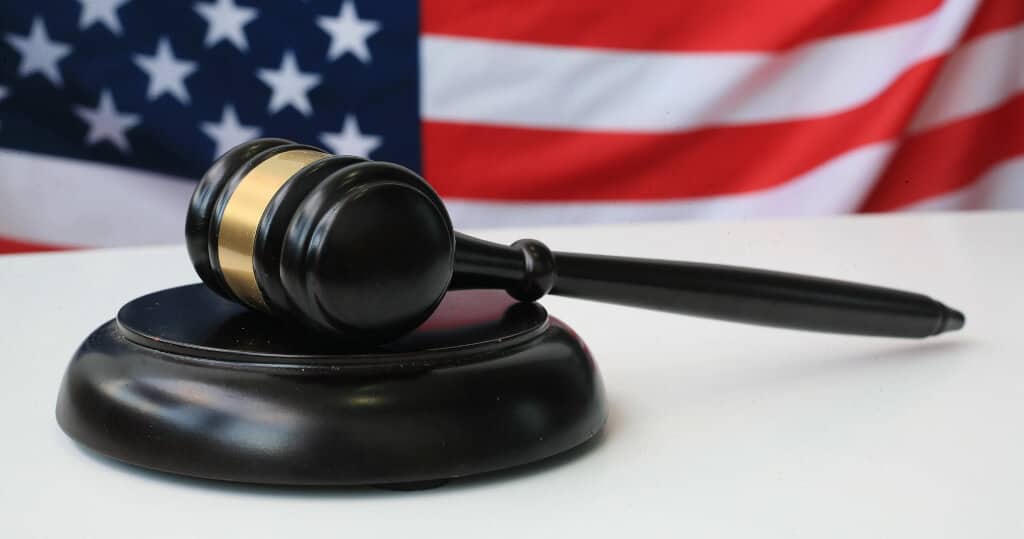Table of Contents
ToggleFull Text of the 6th Amendment to the US Constitution
In all criminal prosecutions, the accused shall enjoy the right to a speedy and public trial, by an impartial jury of the State and district wherein the crime shall have been committed, which district shall have been previously ascertained by law, and to be informed of the nature and cause of the accusation; to be confronted with the witnesses against him; to have compulsory process for obtaining witnesses in his favor, and to have the Assistance of Counsel for his defence.
The 6th Amendment is sometimes informally referred to as the Speedy Trial Amendment or the Right to an Attorney Amendment because these are two of its key protections, but it guarantees several additional rights as well.
What is the 6th Amendment?
The 6th Amendment of the U.S. Constitution guarantees specific rights to individuals accused of crimes, including the right to a fair, public, and impartial trial with legal representation.
6th Amendment Rights
The Sixth Amendment protects the rights of people accused of crimes. It was ratified on December 15, 1791, as part of the Bill of Rights.
What six rights does the 6th Amendment grant to citizens?
The 6th Amendment to the United States Constitution guarantees six key rights to individuals accused of crimes.

It states that any accused person has the right to a lawyer to act on their behalf, the right to a speedy and public trial, and the right to a trial by an impartial jury with the ability to confront witnesses.
6th Amendment Right to an Impartial Jury
The 6th Amendment guarantees the right to an impartial jury. It also ensures that the accused is informed of the nature and cause of the charges against them, as well as the identity of the accuser and any witnesses testifying against them.

6th Amendment Right to Witnesses
The accused must also be able to bring witnesses who will speak in his favor to the court in a criminal trial.
Innocent Until Proven Guilty
The principle of ‘innocent until proven guilty‘ is central in U.S. criminal law, though it is not explicitly stated in the Constitution. The 6th Amendment ensures procedural protections that uphold this principle.

The 6th Amendment of the United States Constitution protects the rights of an accused person and states that they must be able to defend themselves properly.
6th Amendment and the Right to a Fair Trial
The 5th and 14th Amendments primarily protect due process. However, the 6th Amendment guarantees specific rights related to criminal trials. These rights ensure fairness in the judicial process. They include the right to a speedy and public trial, an impartial jury, legal counsel, and the ability to confront witnesses.
The U.S. legal system requires a fair trial before finding a person guilty or imposing punishment. The prosecution bears the burden of proof, while the accused has the right to defend themselves. The 6th Amendment ensures that every defendant receives a fair trial with proper legal representation and protections against unjust prosecution.

6th Amendment Right of the Accused to Legal Counsel
The 6th Amendment guarantees the right to legal counsel, but the requirement for states to provide a public defender was established in Gideon v. Wainwright (1963).

Once the accused has counsel to act on his behalf, the other rights become much easier to achieve.
The right to a jury trial soon after arrest supports the notion that the accused is innocent until proven guilty.
The quicker the legal process moves, the more it benefits the accused, the accusers, and the system’s reputation.
Chain of Evidence
A speedy trial helps prevent prolonged pre-trial detention, ensures that witnesses’ memories remain fresh, and reduces the risk of undue delays that could harm the defense.

Public trials play a crucial role in the judicial process. They reduce the risk of corruption or bribery among judges and prosecutors and ensure greater transparency.
In addition, witnesses may be less inclined to commit perjury if the public can scrutinize their potential lies. On the other hand, trials held behind closed doors can raise suspicions about their fairness.
When a jury tries an accused person, that jury must be impartial. Juries in the United States typically comprise 12 jurors for felony cases, but some state courts allow smaller juries for lesser offenses. Jurors are selected through a voir dire process, where attorneys and judges question potential jurors to ensure impartiality.
In federal courts, jury verdicts in criminal cases must be unanimous. Before 2020, some state courts allowed non-unanimous verdicts, but the Supreme Court’s Ramos v. Louisiana (2020) ruling required unanimous verdicts in all state felony trials. However, this ruling does not apply retroactively to past cases.

Get Smarter on US News, History, and the Constitution
Join the thousands of fellow patriots who rely on our 5-minute newsletter to stay informed on the key events and trends that shaped our nation's past and continue to shape its present.

The 6th Amendment grants defendants the right to confront witnesses testifying against them, ensuring they can cross-examine the prosecution’s witnesses and challenge their testimony.
They also have the right to bring witnesses to speak in their defense.
Principles of the 6th Amendment
Amendment VI enshrines the fundamental human right that an accused person is innocent until proven guilty.
This constitutional right in criminal proceedings is the backbone of a civilized society, and the Founding Fathers were acutely aware of their responsibility to ensure its inclusion in the Bill of Rights.
Related Supreme Court Cases to the Sixth Amendment
Explore the 27 Constitutional Amendments
- 1st Amendment
- 2nd Amendment
- 3rd Amendment
- 4th Amendment
- 5th Amendment
- 6th Amendment
- 7th Amendment
- 8th Amendment
- 9th Amendment
- 10th Amendment
- 11th Amendment
- 12th Amendment
- 13th Amendment
- 14th Amendment
- 15th Amendment
- 16th Amendment
- 17th Amendment
- 18th Amendment
- 19th Amendment
- 20th Amendment
- 21st Amendment
- 22nd Amendment
- 23rd Amendment
- 24th Amendment
- 25th Amendment
- 26th Amendment
- 27th Amendment











2 Responses
What time frame is considered a speedy trial? A year? 2-Years? 5-Years? What?
There is no specific time period mentioned in the 6th Amendment. However, under the Speedy Trial Act of 1974, a trial should occur within 70 days of indictment.
However, the specific length of time may be altered by other state or federal laws and may be adjusted by the judge.